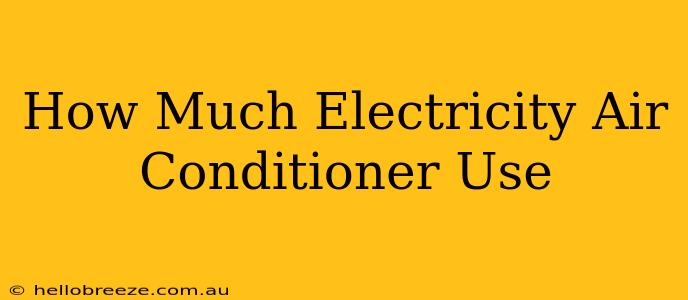Summer's heat is upon us, and with it comes the reliance on our air conditioners to keep us cool and comfortable. But how much electricity does this essential appliance actually consume? Understanding your AC's energy usage is key to managing your energy bills and making informed choices about energy efficiency.
Factors Affecting Air Conditioner Energy Consumption
Several factors influence how much electricity your air conditioner uses. These factors directly impact your energy bill, so it's important to understand them:
1. Size and Type of Air Conditioner:
- BTU Rating: The British Thermal Unit (BTU) rating indicates the cooling capacity of your AC. Higher BTU ratings mean more powerful cooling, but also higher energy consumption. A correctly sized AC for your space is crucial for efficiency. An oversized unit will cycle on and off frequently, wasting energy, while an undersized unit will struggle to cool effectively, also consuming more energy in the long run.
- Type of AC: Window units generally consume less energy than central air conditioning systems, which are typically more powerful and cover larger areas. Portable air conditioners fall somewhere in between. Inverter ACs are also significantly more efficient than older non-inverter models.
2. Energy Efficiency Rating (SEER):
The Seasonal Energy Efficiency Ratio (SEER) is a measure of how efficiently an air conditioner uses energy over an entire cooling season. Higher SEER ratings indicate greater energy efficiency. Look for air conditioners with high SEER ratings for significant energy savings.
3. Usage Patterns:
- Runtime: The longer your AC runs, the more electricity it consumes. Strategic use, such as setting higher temperatures while away from home or using fans to supplement cooling, can significantly reduce energy usage.
- Temperature Setting: Lowering the thermostat significantly increases energy consumption. Even a small difference in temperature setting can lead to noticeable differences in your energy bill.
4. Maintenance:
- Clean Filters: Dirty air filters restrict airflow, forcing your AC to work harder and consume more electricity. Regular filter cleaning (at least monthly) is essential for optimal efficiency.
- Regular Servicing: Professional servicing ensures your AC is operating at peak efficiency. This includes checking refrigerant levels and inspecting for any leaks or malfunctions.
Estimating Your Air Conditioner's Energy Usage
Determining the precise electricity usage of your AC requires specific information, including its BTU rating, SEER rating, and average runtime. However, you can get a rough estimate using online energy calculators or by checking your electricity bill. These tools often allow you to input relevant details about your AC and estimate your monthly energy consumption for cooling.
Tips for Reducing Air Conditioner Energy Consumption
Several strategies can help reduce your AC's energy consumption and lower your electricity bill:
- Proper Insulation: Good insulation minimizes heat transfer, reducing the load on your AC.
- Seal Air Leaks: Seal any cracks or gaps in windows and doors to prevent cool air from escaping and warm air from entering.
- Use Window Treatments: Curtains, blinds, or shades can help block sunlight and reduce the heat entering your home.
- Strategic Ventilation: Use fans to circulate cool air more efficiently, reducing the strain on your AC.
- Programmable Thermostat: A programmable thermostat allows you to schedule your AC to run only when needed, saving energy during unoccupied periods.
By understanding the factors influencing your air conditioner's energy consumption and implementing energy-saving strategies, you can effectively manage your energy use and minimize your environmental impact while keeping your home comfortably cool.

